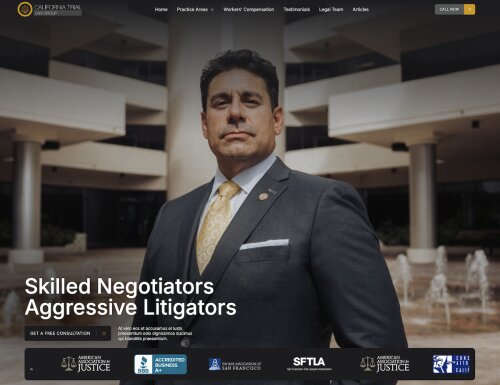Best Lawsuits & Disputes Lawyers in Georgia
Share your needs with us, get contacted by law firms.
Free. Takes 2 min.
Or refine your search by selecting a city:
List of the best lawyers in Georgia, United States
About Lawsuits & Disputes Law in Georgia, United States
Lawsuits and disputes law in Georgia covers all matters related to resolving civil disagreements between individuals, businesses, or other organizations. These can range from contractual disagreements and property disputes to personal injury claims, employment disputes, and more. In Georgia, the goal of the civil court system is to provide fair and impartial resolutions to such conflicts, whether through negotiation, mediation, arbitration, or formal court proceedings. The legal framework in Georgia follows specific state statutes, court rules, and procedures designed to ensure every party receives due process and the opportunity to present their case.
Why You May Need a Lawyer
There are many situations in which you may benefit from the assistance of a lawyer experienced in lawsuits and disputes in Georgia. Common scenarios include:
- You are being sued by another party or individual.
- You need to file a lawsuit to resolve a business or personal matter.
- You are involved in a contract dispute over goods, services, or employment.
- You have suffered financial or physical harm due to another person's actions.
- You are facing landlord-tenant disagreements or property-related disputes.
- You are dealing with debt collection lawsuits or require assistance with small claims.
- You have been threatened with legal action and want to understand your rights.
- Your insurance claim has been wrongfully denied or underpaid.
In any situation where you feel your rights have been violated or you are uncertain about your legal responsibilities, consulting an attorney early often helps avoid costly mistakes.
Local Laws Overview
Understanding the local laws governing lawsuits and disputes in Georgia is crucial for successful outcomes. Some key aspects include:
- Georgia follows a "comparative fault" rule in negligence cases, meaning damages can be reduced if you are partly at fault.
- There are specific statutes of limitations for different types of cases, such as personal injury and breach of contract.
- The monetary limit for small claims court (known as Magistrate Court) is currently $15,000.
- Georgia courts encourage parties to resolve disputes through negotiation and alternative dispute resolution before resorting to trial.
- Court procedures are governed by the Georgia Code and Georgia Civil Practice Act, which dictate filing requirements, timelines, and discovery processes.
- Georgia law generally requires the losing party to pay their own attorney's fees, except in cases where a statute or contract allows for fee-shifting.
Familiarity with these and other local rules can be critical when navigating the legal system or engaging in any form of dispute resolution.
Frequently Asked Questions
What is the statute of limitations for filing a lawsuit in Georgia?
The statute of limitations depends on the type of case. For personal injury claims, it is typically two years from the date of injury. For breach of contract, it is generally four or six years depending on the nature of the contract. Always consult an attorney to ensure you file within the correct time frame.
Can I represent myself in a Georgia court lawsuit?
Yes, individuals have the right to represent themselves in Georgia courts. However, legal proceedings can be complex and mistakes may impact your chance of success, so consulting an attorney is recommended.
What is "comparative fault" and how does it affect my case?
Comparative fault means that if you are partially responsible for the harm or damages, your compensation may be reduced by your percentage of fault. For instance, if you are found 20 percent at fault, your recovery may be reduced by that amount.
What is mediation and do I have to participate?
Mediation is a form of alternative dispute resolution where a neutral third party helps facilitate a settlement between disputing parties. Georgia courts often encourage or require mediation before setting a trial date.
How much can I sue for in small claims court (Magistrate Court) in Georgia?
The maximum amount you can claim in Georgia Magistrate Court is $15,000, excluding interest and court costs.
What happens if I ignore a lawsuit filed against me?
If you ignore a lawsuit, the other party may obtain a default judgment against you, which could result in wage garnishment, liens on property, or other enforcement actions.
What costs are involved in filing a lawsuit in Georgia?
Court filing fees vary depending on the court and type of case. Additional costs may include service of process, discovery expenses, and attorney fees. Fee waivers are available in some circumstances if you are unable to pay.
Can I recover attorney’s fees if I win my case?
In most cases, each party is responsible for their own attorney’s fees unless there is a specific Georgia statute or contract provision allowing the winner to recover these fees.
How long does a lawsuit typically take to resolve in Georgia?
The duration depends on the nature and complexity of the case. Simple matters may resolve in months, while more complex disputes can take a year or longer, especially if they proceed to trial.
What should I bring to my first meeting with a lawyer?
Bring all relevant documents, such as contracts, correspondence, receipts, court papers, and a summary of the events related to your case. This helps your lawyer assess your situation more effectively.
Additional Resources
If you require more information or assistance, consider exploring these helpful resources in Georgia:
- Georgia Legal Services Program offers free legal help to low-income residents.
- State Bar of Georgia provides lawyer referrals and legal information for the public.
- Georgia Magistrate Court handles small claims cases and offers self-help resources.
- Governor's Office of Consumer Protection assists with consumer disputes and complaints.
- Local public law libraries and self-help centers offer educational materials and forms.
Next Steps
If you believe you need legal help with a lawsuit or dispute in Georgia, the following steps are recommended:
- Gather all documentation and information related to your matter.
- Research your issue and review the basic laws outlined above to better understand your rights.
- Contact a qualified attorney who specializes in lawsuits and disputes to schedule a consultation.
- Consider reaching out to local legal aid organizations if you have limited income or resources.
- Be prompt in seeking legal advice, as deadlines for filing lawsuits are strictly enforced.
Taking these steps can help protect your interests and improve your chances of a successful resolution.
Lawzana helps you find the best lawyers and law firms in Georgia through a curated and pre-screened list of qualified legal professionals. Our platform offers rankings and detailed profiles of attorneys and law firms, allowing you to compare based on practice areas, including Lawsuits & Disputes, experience, and client feedback.
Each profile includes a description of the firm's areas of practice, client reviews, team members and partners, year of establishment, spoken languages, office locations, contact information, social media presence, and any published articles or resources. Most firms on our platform speak English and are experienced in both local and international legal matters.
Get a quote from top-rated law firms in Georgia, United States — quickly, securely, and without unnecessary hassle.
Disclaimer:
The information provided on this page is for general informational purposes only and does not constitute legal advice. While we strive to ensure the accuracy and relevance of the content, legal information may change over time, and interpretations of the law can vary. You should always consult with a qualified legal professional for advice specific to your situation.
We disclaim all liability for actions taken or not taken based on the content of this page. If you believe any information is incorrect or outdated, please contact us, and we will review and update it where appropriate.
Browse lawsuits & disputes law firms by service in Georgia, United States
Georgia, United States Attorneys in related practice areas.
Browse lawsuits & disputes law firms by city in Georgia
Refine your search by selecting a city.
















